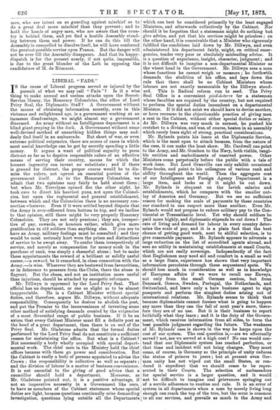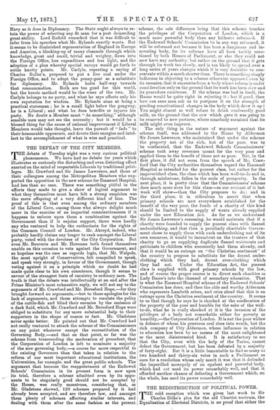LIBERAL "FADS."
IS the cause of Liberal progress served or injured by the pursuit of what we may call " Fads "? Is it a wise thing to make annual and useless attacks upon the Secret- Service Money, the Honorary Colonelcies, the office of Lord Privy Seal, the Diplomatic Staff ? A Government without the means of obtaining information secretly, even in this virtuous and enlightened age, is a government working at an immense disadvantage, we might almost say a government disarmed. An army without an Intelligence department is a blind giant groping in the dark. A Government without some well-devised method of unearthing hidden things may sud- denly find itself in an ambuscade. But short of war, or even extreme political exigencies, there are scores of cases in which most useful knowledge can be got by secretly spending a little
money. It argues a want of political sagacity to press distrust so far as to deprive responsible rulers of an effective means of serving their country, means for which the keenest ingenuity can invent no substitute ; and if there is ground for distrust, the proper course would be to dis- miss the rulers, not uproot an essential portion of the government itself. As to the Honorary Colonelcies, we admit that two opinions may fairly be held about them ; but when Mr. Trevelyan opened fire the other night, he took care to direct his heaviest guns, not upon the Colonel- cies, but upon the regimental and general establishment, between which and the Colonelcies there is no necessary con- nection whatever. Even if it were settled beyond dispute that the Army is over-officered from bottom to top, and we incline to that opinion, still there might be very properly Honorary Colonelcies. They are not only pensions; they are, irrespec- tive of pay, rewards, or honours rather, which give more gratification to old soldiers than anything else. If you are to have an Army, military feelings must be consulted ; and they would be most seriously hurt were the prizes and distinctions of service to be swept away. To confer them irrespectively of service, and merely as compensation for money sunk in the purchase of rank, was simply a shameful abuse ; but to make these appointments the reward of a brilliant or solidly useful career,—a reward, be it remarked, in close connection with the Army,—is wise. Wherever they are bestowed from favouritism, or in deference to pressure from the Clubs, there the abuse is flagrant. But the abuse, and not an institution more useful than injurious, should be attacked by energetic reformers.
Mr. Dillwyn is oppressed by the Lord Privy Seal. That official has no department, or one so slight as to be almost inappreciable. He is a Cabinet Minister without special duties, and therefore, argues Mr. Dillwyn, without adequate responsibility. Consequently he desires to abolish the post, and put the Premier to the inconvenience of inventing some other method of satisfying demands created by the exigencies of a most diversified range of public business. If it be an axiom that every Cabinet Minister must fill a definite post as the head of a great department, then there is an end of the Privy Seal. Mr. Gladstone admits that the formal duties performed by the Lord Privy Seal do not constitute a sufficient reason for maintaining the office. But what is a Cabinet ? Not necessarily a body wholly occupied with special depart- mental work. The chief men in the Ministry hold the chief offices because with them go power and consideration. But the Cabinet is really a body of persons appointed to advise the Crown ; the responsibility is collective as well as separate ; and the division of labour is a matter of business convenience. It is not essential to the giving of good advice that a councillor should hold a department. Moreover, as Mr. Gladstone pointed out, it is a positive advantage, if not an imperative necessity in a Government like ours, to have as members of the Cabinet statesmen whose special duties are light, because questions continually arise demanding investigation, questions lying outside all the Departments
which can best be considered primarily by the least engaged Ministers, and afterwards collectively by the Cabinet. Nor should it be forgotten that a statesman might do nothing but give advice, and yet that his services might be priceless ; on the other hand, it is conceivable that a Minister who rigorously fulfilled the conditions laid down by Mr. Dillwyn, and even administered his department fairly, might, on critical emer- gencies, tender very poor or absolutely misleading advice. It is a question of experience, insight, character, judgment ; and it is not difficult to imagine a non-departmental Minister as the wisest head in the Government. Mr. Dillwyn sees a man whose functions he cannot weigh-or measure ; he forthwith demands the abolition of his office, and lays down the rule that there shall be no Cabinet Ministers whose labours are not exactly measurable by the Dillwyn stand- ard. This is Radical reform run to seed. The Privy Seal Office is a convenient pied-a-terre for a statesman whose faculties are required by the country, but not required to perform the special duties incumbent on a departmental Minister. If it did not exist we should have to devise another, or have recourse to the objectionable practice of giving men a seat in the Cabinet, without either special duties or salary. As Mr. Dillwyn was very much in earnest, he pushed his crotchet to a division, and was, of course, beaten in an assembly which rarely loses sight of strong, practical considerations.
Mr. Rylands points his lance at the Diplomatic Service, which is the most open to attack because, from the nature of the case, it can make the least show. Mr. Cardwell can point to the Army, and Mr. Goschen to the Navy, both visible, tangi- ble entities and embodiments of reserved power. Other Ministers come perpetually before the public with a tale of work done. But Lord Granville can only exhibit occasional Blue-books, and point to his colleagues of various rank and ability throughout the world. Then the aggregate cost of our Intelligence and Foreign Agency Department is a large item, and looks as if it might be cut down. Mr. Rylands is eloquent on the lavish salaries and establishments, which he compares with the smaller out- lay of America and Germany. But we see no sufficient reason for making the scale of payments by these countries our standard in one respect more than another. Even Mr. Rylands would not propose to reduce military pay to the Con- tinental or Transatlantic level. Yet why should soldiers be paid more highly, and diplomatic stipends be cut down V The rate of living and demand for labour in every country deter- mine the scale of pay, and it is a plain fact that the best chance of getting good work, next to skilful selection, is to give reasonable payment. Mr. Rylands appears to advocate a large reduction on the list of accredited agents abroad, and sees no utility in maintaining establishments at small Courts, which are not really sovereign. Independently of the fact that Englishmen may need aid and comfort in a small as well as a large State, experience has shown that very important information percolates through these sequestered spots. We should lose much in consideration as well as in knowledge of European affairs if we were to recall our Envoys, not only from the small German centres, but from Denmark, Greece, Sweden, Portugal, the Netherlands, and Switzerland, and leave only a bare business agent to sign passports and perform the simplest duties arising out of international relations. Mr. Rylands seems to think that because diplomatists cannot foresee what is going to happen any more than they can the fall of next year's snow, there- fore they are of no use. But it is their business to report faithfully what they learn ; and it is the duty of the Govern- ment, which receives information from all sides, to form the best possible judgment regarding the future. The weakness of Mr. Rylands' case is shown in the way he harps upon the cost of our system. The real question is,—are we effectually served ? not, are we served at a high cost ? No one would con- tend that our Diplomatic system has reached perfection, or that time and incident will not bring changes. They must come, of course, in Germany as the principle of unity reduces the status of princes to peers ; but at present even Ger- man unity has not wiped out the small States, or ren- dered it expedient that we should cease to be repre- sented in their Courts. The selection of ambassadors for special service is a larger question, and it would not be difficult to imagine real grievances springing out of a servile adherence to routine and rule. It is an error of system in all departments when a man by merely living long enough can reach the top of the tree, but the error is common to all our services, and prevails as much in the Army and
Navy as it does in Diplomacy. The State ought always to re-1 tain the power of selecting any fit man for a post demanding I great ability. Lord Enfield remarked that it was difficult to infer from his speeches what Mr. Rylands exactly wants. But it seems to be diminished representation of England in Europe and America, a blocking-up of many channels through which knowledge, great and small, trivial and weighty, flows into the Foreign Office, less expenditure and less light, and the adoption of a plan whereby special envoys would go forth to
settle knotty points. Mr. Carlyle, repeating a saying of Charles Buller's, proposed to put a live coal under the Foreign Office, and to adopt the penny-post as a substitute for diplomacy. Mr. Rylands halts half-way towards that consummation. Both are too good for this world, but the heroic method would be the wiser of the two. Mr. Carlyle belongs to no party, and what he says affects only his own reputation for wisdom. Mr. Rylands aims at being a practical statesman ; he is a small light below the gangway, he is a Liberal ; and what he does benefits or injures his party. No doubt a Member must " do something," although sensible men may not see the necessity ; but it would be a blessed thing for the cause of rational improvement if Liberal Members would take thought, leave the pursuit of " fads " to their honourable opponents, and devote their energies and intel- lect to the accomplishment of what is wise and practical.



































 Previous page
Previous page